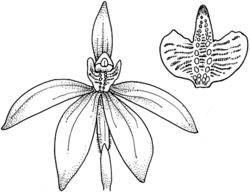Common name: Blue Caladenia, Blue Fairy
Cyanicula caerulea (R.Br.) Hopper & A.P.Br. APNI* Synonyms: Caladenia caerulea R.Br. APNI*
Cyanicula caerulea var. heliotropica (Rupp) Hopper & A.P.Br. APNI*
Caladenia caerulea var. helitropica Rupp APNI*

Description: Terrestrial herb.
Leaf linear to 7 cm long, 5 mm wide, and sparsely hairy.
Inflorescence to 15 cm high, usually 1-flowered. Sepals and lateral petals to 2 cm long, the outer surfaces with scattered bluish hairs, the inner surfaces blue (rarely white); dorsal sepal held erect. Labellum ± cuneate, usually 4–8 mm long, to 7 mm wide, 3-lobed, blue with dark blue transverse bands towards the base, the tip often bright yellow; lateral lobes entire and undulate; midlobe entire, recurved. Calli in 2 rows with smooth stalks and clubbed, yellow heads extending almost to tip of midlobe but becoming shorter on midlobe. Column 7–10 mm long, with moderately expanded apical wings and dark bluish blotches; basal glands absent.
Flowering: June–September (northern populations tend to flower earlier than southern).
Distribution and occurrence: Grows in open woodland and shrubland, often along ridges or slopes with shallow, stony soils; south from Torrington.
NSW subdivisions: NC, CC, SC, NT, CT, ST, NWS, CWS, SWS, NWP, SWP
Other Australian states: Qld Vic. W.A. S.A.
C. caerulea very rarely hybridizes with Caladenia carnea. C. caerulea has been known to hybridize with Glossodia major to form an intergeneric hybrid.
Text by P. H. Weston and contributors as listed under genus headings
Taxon concept:
APNI* Provides a link to the Australian Plant Name Index (hosted by the Australian National Botanic Gardens) for comprehensive bibliographic data
***The AVH map option provides a detailed interactive Australia wide distribution map drawn from collections held by all major Australian herbaria participating in the Australian Virtual Herbarium project.
|


